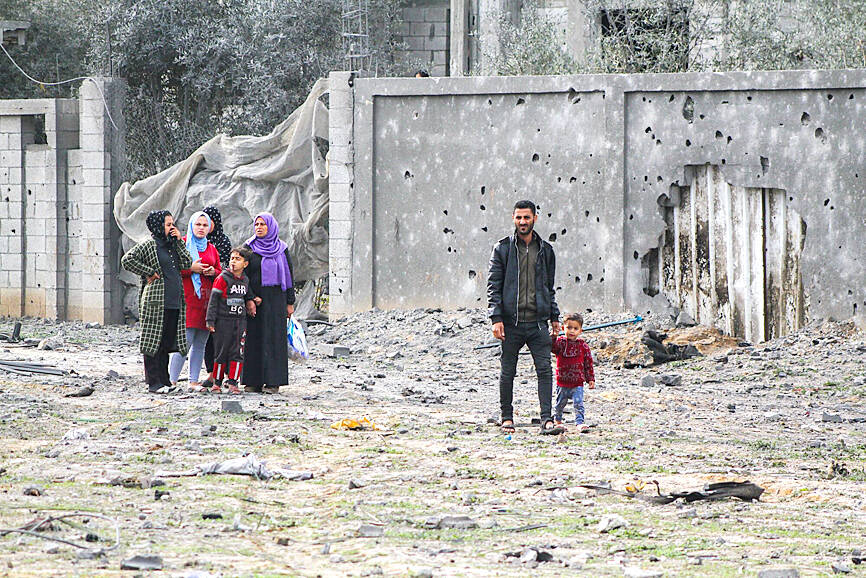Overnight strikes on Gaza killed dozens, the Hamas-run territory’s health ministry said yesterday, as Israel’s spy chief joined talks in Paris seeking to unblock negotiations on a truce.
The negotiations come after a plan for a post-war Gaza unveiled by Israeli Prime Minister Benjamin Netanyahu drew criticism from key ally the US, and was rejected by Hamas and the Palestinian Authority in the occupied West Bank.
They also come alongside deepening fears for Gaza’s civilians.

Photo: Bloomberg
The UN Relief and Works Agency for Palestine Refugees said that Gazans were “in extreme peril while the world watches.”
Hamas yesterday morning said that Israeli forces had launched more than 70 strikes on civilian homes in Deir al-Balah, Khan Yunis and Rafah, among other locations, over the previous 24 hours.
At least 92 people were killed, the health ministry said.
The Palestinian Islamist movement that has ruled Gaza since 2007 also said fighting was raging in the northern district of Zeitun.
Television footage showed distraught Gazans on Friday lining up for food in Jabalia, also in the besieged Palestinian territory’s devastated north, and protesting over dire living conditions.
“We have no water, no flour and we are very tired because of hunger. Our backs and eyes hurt because of fire and smoke,” said one of them, Oum Wajdi Salha.
Israel’s retaliatory offensive has killed at least 29,606 people, mostly women and children, the latest count by Gaza’s health ministry showed.
Netanyahu this week unveiled a plan for post-war Gaza that envisages civil affairs being run by Palestinian officials without links to Hamas.
The plan says that, even after the conflict, Israel’s army would have “indefinite freedom” to operate throughout Gaza to prevent any resurgence of terror activity, according to the proposals.
It also says Israel would move ahead with a plan, already under way, to establish a security buffer zone inside Gaza along the territory’s border.
A senior Hamas official dismissed the plan as unworkable.
“When it comes to the day after in the Gaza Strip, Netanyahu is presenting ideas which he knows fully well will never succeed,” Osama Hamdan told reporters in Beirut.
US National Security Council Coordinator for Strategic Communications John Kirby said that Washington had been “consistently clear with our Israeli counterparts” about what was needed in post-war Gaza.
“The Palestinian people should have a voice and a vote ... through a revitalized Palestinian Authority,” he said, adding that the US also did not “believe in a reduction of the size of Gaza.”

Right-wing political scientist Laura Fernandez on Sunday won Costa Rica’s presidential election by a landslide, after promising to crack down on rising violence linked to the cocaine trade. Fernandez’s nearest rival, economist Alvaro Ramos, conceded defeat as results showed the ruling party far exceeding the threshold of 40 percent needed to avoid a runoff. With 94 percent of polling stations counted, the political heir of outgoing Costa Rican President Rodrigo Chaves had captured 48.3 percent of the vote compared with Ramos’ 33.4 percent, the Supreme Electoral Tribunal said. As soon as the first results were announced, members of Fernandez’s Sovereign People’s Party

MORE RESPONSIBILITY: Draftees would be expected to fight alongside professional soldiers, likely requiring the transformation of some training brigades into combat units The armed forces are to start incorporating new conscripts into combined arms brigades this year to enhance combat readiness, the Executive Yuan’s latest policy report said. The new policy would affect Taiwanese men entering the military for their compulsory service, which was extended to one year under reforms by then-president Tsai Ing-wen (蔡英文) in 2022. The conscripts would be trained to operate machine guns, uncrewed aerial vehicles, anti-tank guided missile launchers and Stinger air defense systems, the report said, adding that the basic training would be lengthened to eight weeks. After basic training, conscripts would be sorted into infantry battalions that would take

GROWING AMBITIONS: The scale and tempo of the operations show that the Strait has become the core theater for China to expand its security interests, the report said Chinese military aircraft incursions around Taiwan have surged nearly 15-fold over the past five years, according to a report released yesterday by the Democratic Progressive Party’s (DPP) Department of China Affairs. Sorties in the Taiwan Strait were previously irregular, totaling 380 in 2020, but have since evolved into routine operations, the report showed. “This demonstrates that the Taiwan Strait has become both the starting point and testing ground for Beijing’s expansionist ambitions,” it said. Driven by military expansionism, China is systematically pursuing actions aimed at altering the regional “status quo,” the department said, adding that Taiwan represents the most critical link in China’s

EMERGING FIELDS: The Chinese president said that the two countries would explore cooperation in green technology, the digital economy and artificial intelligence Chinese President Xi Jinping (習近平) yesterday called for an “equal and orderly multipolar world” in the face of “unilateral bullying,” in an apparent jab at the US. Xi was speaking during talks in Beijing with Uruguayan President Yamandu Orsi, the first South American leader to visit China since US special forces captured then-Venezuelan president Nicolas Maduro last month — an operation that Beijing condemned as a violation of sovereignty. Orsi follows a slew of leaders to have visited China seeking to boost ties with the world’s second-largest economy to hedge against US President Donald Trump’s increasingly unpredictable administration. “The international situation is fraught